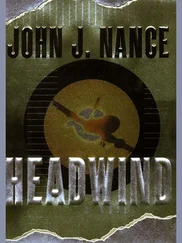“It’s immaterial. We’re landing regardless,” Marty answered, pulling the thrust levers a bit more as the airspeed tried to increase.”
“Four miles out, Marty.”
“Got it.”
What the hell am I forgetting? Marty’s brain again demanded, and once more there were no answers, just the clucking of some distant part of his mind that he would deeply regret ignoring.
“Three miles, holding one dot low, on speed,” Ryan intoned.
“Stand by for the gear at one mile.”
“Standing by. Five hundred feet to go, Marty. No decision height.”
“Roger.”
“Coming up on two miles to the runway, on speed, on glide slope minus one.”
“Roger.”
“Four hundred above and one mile,” Ryan was saying.
“Gear down,” Marty commanded, as Ryan’s hand moved the lever downward, starting the hydraulic sequence that lowered the huge main gear trucks and the nose gear into place.
Whatever had been eating at him loomed suddenly as one of the most profound warnings he had ever ignored, and this time it refused to go away. A very insistent part of his mind screamed “Go Around!” and finally, at a radar altimeter reading of 190 feet above the terrain, the last tumbler between nuance and reality fell into place.
“GEAR UP!” Marty commanded.
“What?”
“Going around. Gear Up! Tell the tower.”
Marty nursed the throttles forward while pulling gently to arrest the descent of the big jet at 120 feet, starting a shallow climb.
“WHAT ARE YOU DOING?” Ryan demanded, eyes wide.
“Tell them we’re on the go!”
Ryan froze for a few microseconds before realizing that a protest over how little fuel they had was now too late. The runway was zipping by unseen beneath them, and with it, it felt like their last chance was slipping away.
“Denver, Regal Twelve is… ah… on the go,” Ryan said as ordered.
“Roger, Twelve. Climb straight ahead to seven thousand. What are your intentions?”
Unaware that his finger had once again pressed the transmit button, Ryan’s thoughts found voice: “I wish the hell I knew!”
Present Day — September 3
The neatly dressed man in a crisp white shirt and well-cut blue suit was a far cry from the disheveled and disillusioned pilot who had plopped down in the firm’s main conference room months before with radioactive toxicity. That version of Marty Mitchell had been a study in smoldering anger and determined, martyred defeat. This version was ready for battle and, if not full of confidence, at least focused on what must be done. His fist-shaking rage atop the mountain had been a primal scream at the loss of his integrity, but without really wanting to admit it to himself, it had been Judith’s caring and determination that had restored the possibility of vindication… however remote. “ When everything is black and you see a flicker of light, you follow it — no matter how far and faint it is,” he had explained.
And that, Judith Winston thought, looking at her client, was a significant victory, and something she could be proud of, however this mess turned out.
She hesitated for a second, watching him from across the office through the glassed walls of the conference room as she organized her thoughts. Since the Long’s Peak incident and the visits to his hospital room, the contentious barriers between them had slowly dissolved. Even last week’s meeting at the same conference table — a grueling all-day affair to go over every minute detail of the case, the crash, and the critical aspects of the upcoming trial — had been devoid of the fulminating anger at the system that had marked their early meetings. He was still unable to laugh easily — to shed the appearance of a man quietly spooked and ready to run. But at times she had managed to elicit a few genuine smiles.
Judith moved easily into the room, quietly pleased that Marty’s gentlemanly upbringing brought him to his feet as she motioned him back down.
“I… dusted off an old suit,” he said, a bit self-consciously.
“Doesn’t look old to me!” she replied, taking a more detailed look. “Perfect. Quite professional and right for the courtroom.”
“I thought about wearing my airline uniform,” he added.
“So did I,” she said, tilting her head. “I’m still mulling over whether that could be interpreted as somehow arrogant or inflammatory. Or it might just focus the jury on the gravity of the situation. You know, you’re not just someone they call a pilot. Here sits a uniformed airline captain with all his experience and gravitas. And, after all, Regal has yet to fire you, therefore it’s not misrepresentation.”
“Regal would be apoplectic.”
“Fuck ‘em.”
He hesitated, smiling slowly at her response. “So… bottom line… you’re not sure about me wearing the formal uniform?” Marty asked.
She sat down next to him in one of the high-backed leather swivel chairs.
“Frankly, no. Before we decide, though, I want to consult a friend who does big criminal cases. Actually, I’ve been consulting with her quite a bit to make sure I… don’t screw this up in any way.” A ripple of apprehension twittered down Judith’s spine at the thought that she’d just admitted what every aspect of her prior demeanor had been designed to refute: That criminal defense was neither her familiar territory not an area in which her confidence level was unassailably high. Self-doubt was one thing they both had in common.
“I appreciate that,” he said, looking down at the table where his fingers were drumming softly. He looked back up. “Judith, I know this is a stretch for you… not your native turf. And I know the damned judge wouldn’t let you withdraw from the case. ”
She started to protest that she was well prepared now, but something in his eyes told her it was unnecessary, and he’d already raised the palm of his hand to stop her.
“You’re a damn good corporate lawyer, which means you’re a damn good lawyer, period. You don’t need to say any more. I truly appreciate what you’re doing for me.”
“Thank you.”
He cleared his throat, as if to disavow the heartfelt nature of the statement.
“Speaking of the stupid judge, what happened this morning to our motions?”
She glanced past him for a second as if taking in what was happening in the reception area, then looked back.
“It’s more the damned DA than the judge, and of course Grant Richardson was there himself, full of restrained outrage at the mere idea that I would dare file a motion to quash the indictment, let alone a motion to dismiss.”
“I take it both were rejected?”
“Yes, but… the judge said something interesting, something that makes me think he isn’t rubber stamping the idea that criminal charges are legal in a case like this.”
Marty was leaning forward. “Tell me.”
“He said that, without reference to any future appeal, there was a societal interest in determining whether a purposeful act by a captain in discharging official duty constituted even a prima facie case of premeditation sufficient to support a murder charge. In other words, he gave voice to one of my main arguments, that the legislature never meant for the premeditated aspect of murder to include a captain’s decision. Richardson tried to bat it down, but it was there and on the record. It won’t stop the trial, but it’s very well written.”
“Is my union doing anything?”
Judith shook her head. “Just monitoring. Someone will be in the courtroom, and they’ll file a friend of the court brief, an “amicus” brief — if we lose and have to appeal. But they’re confused. This isn’t a case of prosecuting a pilot for making a mistake, which always lights a torch under their tails. This is alleging criminal responsibility because you knew the consequences if you didn’t slow down, and you decided not to slow down anyway. Where the union guys jump the track and glaze over is when we talk about Regal’s attempt to intimidate you. The DA says it doesn’t matter, and that this case is not about you following orders, because as a captain in an emergency you don’t have to. It’s about you having been provided the indisputable information of what would happen if you did Plan A versus Plan B, and, knowing the consequences, you still decided to go with Plan A. Since Plan A included a high probability of killing someone, that’s where the theory of premeditated or purposeful murder comes in.”
Читать дальше












